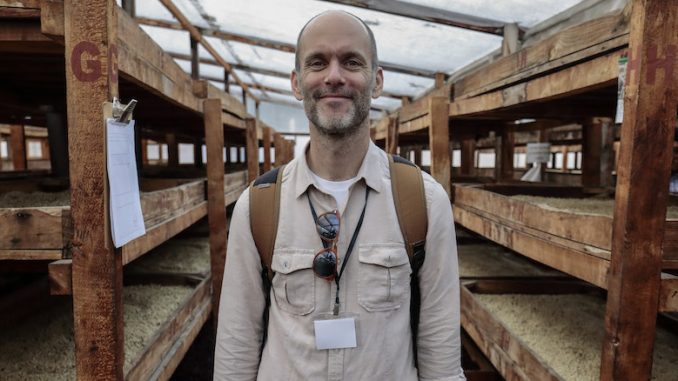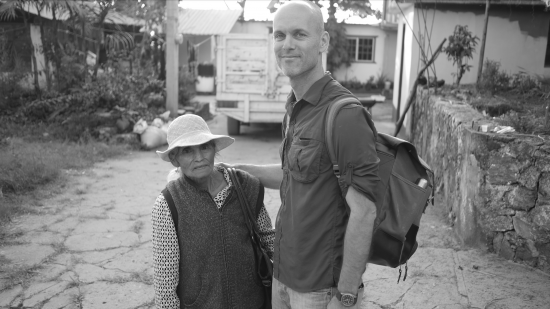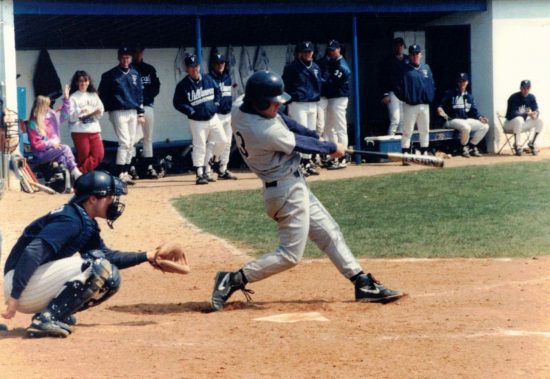
We continue our conversation with Michael Sheridan from the June + July 2021 issue of Barista Magazine.
BY CHRIS RYAN
BARISTA MAGAZINE ONLINE
Cover photo by Oscar Leiva
In the June + July 2021 issue of Barista Magazine, we chatted with Michael Sheridan (he/him), the director of sourcing and shared value at Chicago-based Intelligentsia Coffee. Michael is the recipient of the Specialty Coffee Association’s 2021 Sustainability Award, honoring his career-long dedication to supporting local development in coffee communities, both at Intelligentsia, and before that, at humanitarian organization Catholic Relief Services (CRS). In our print interview with Michael, he told us more interesting things than we had room to print, so we’re continuing our conversation here.
Chris Ryan: You worked with Catholic Relief Services for many years on coffee projects, and you described coffee as being an important cash crop in part because it’s “smallholder, high-value, and shade-tolerant.” Can you tell us more about how you saw coffee impacting coffee communities?
Michael Sheridan: While I did not see coffee lifting large numbers of people decisively out of poverty, I did see a lot to validate the narrative that coffee is a “hero crop.” Coffee was almost always the most profitable licit cash crop smallholders could grow, and that counts for a lot in countries where illicit crops are widely produced, almost always in the context of instability and violence.
Coffee was often the focal point for inclusive social organization, as smallholder growers joined forces with their neighbors to aggregate supply and engage with markets. And as my colleagues at CRS taught me, if you can’t turn a landscape into a nature reserve to preserve natural resources, growing coffee organically in the shade is the next best thing.
Conversely, turning cornfields and cow pastures into shaded coffee groves is emblematic of the kind of regenerative agriculture that is ascendant today in conservation and development circles. While coffee wasn’t perfect, there was a lot to like about a career in international development laser-focused on unleashing coffee’s potential for positive economic, social, and environmental impact.

How did your time at CRS help you get interested in working for a coffee company like Intelligentsia?
Before I started working on coffee at CRS, I had little interest in business. But my job required me to engage actively with coffee market actors. As someone who was not a trained agronomist but had gradually developed a wide network in the coffee industry, one of the best ways for me to create value for the growers I worked with was to help them foster lasting relationships with the roasters I had come to know over the years. Through that work I came to deeply appreciate and respect the role that coffee companies can play in local development in coffee communities. Projects like the ones I used to lead for a living (at CRS) can channel critical resources to growers who can make good use of them, but in my experience they don’t have lasting impact if they don’t foster the kinds of market relationships that outlast the projects that fostered them. The more of this work I did, the more interested I became in trying my hand at buying coffee and driving impact through purchasing, not projects.
You worked on CRS’ Borderlands pilot project in Colombia, which facilitated the sale of small amounts of coffee from smallholders. Now you can make a more significant buying impact through Intelligentsia—in our longer interview, you discussed the ECWx social impact initiative you helped launch. Can you describe the impact you’re having through those purchases?
Beginning with the second ECWx in Honduras in 2019, we committed to purchase small lots from participating organizations in every event as a way to jumpstart new trading relationships. The idea is to start small with “commercial pilots,” then grow over time if both sides feel like we have found a good fit. This is how we approached things during the Borderlands project I led in Colombia.
In Borderlands, we started by facilitating the sale of something like 16 bags of coffee from project participants to three project partners in 2013. Last year, for the third consecutive year, project participants sold more than 10 containers to those same Borderlands partners. ECWx hasn’t hit the 10-container mark yet, but it is following a familiar pattern of gradual growth. Last year we bought 20 bags from one group in Central America. Earlier this year I approved more than 220 bags from the same group. This is why I came to Intelligentsia to begin with—to try to drive value through the supply chain, and to use our purchases to expand opportunities for smallholder growers.

Finally, you’ve mentioned not having a journalism background, despite working at newspapers in Latin America before working in development. Yet writing seems to be a constant in your career, from the Coffeelands blog you did at CRS, to the Intelligentsia blog, to even LinkedIn. Why do you gravitate toward writing, and what does it mean to you as a way to communicate with the coffee world and beyond about the projects you’re working on and their impact?
I know, I just can’t seem to stop writing about coffee! That’s partly because I really love doing it. But it’s mostly because I came to understand that my work required it of me.
I started the Coffeelands blog because I understood that my vantage point at the intersection of coffee and international development was unique. The work was an almost endless source of illumination for me. It generated insights I could not have come by if I was still living in the States or working on other parts of the coffee chain. I believed that sharing what I was learning could also be enlightening for others working in coffee.
At the time, I was part of a group at CRS that was thinking strategically about impact, and we came to appreciate the limitations of the projects we ran in fostering lasting change. We began to see public policy and private-sector practices as at least equally important—and often far more important—to the long-term prospects for community development in the places we worked. This new understanding led to a radical change in how we thought about creating impact. In addition to running effective projects, we realized that we needed to influence decision-makers in government and business. The writing became more strategic, an integral part of a strategy for achieving impact through influence.
The blog and the occasional article I have written for coffee publications over the years have contributed to ongoing conversations around inclusion, equity, and sustainability in coffee. At its best, the writing helped to frame new conversations or reframe existing ones to include new perspectives.
I never wrote as consistently—or as well, perhaps—as I did while I was at CRS and publishing new posts to the Coffeelands blog every few days for more than seven years. I am writing now less frequently than I did before because my work doesn’t require it of me in the same way it once did. But I continue to pursue writing projects because I believe that despite more media coverage of coffee than ever before, there are still blind spots in our field of vision, stories that haven’t been told, and perspectives that haven’t been heard.

